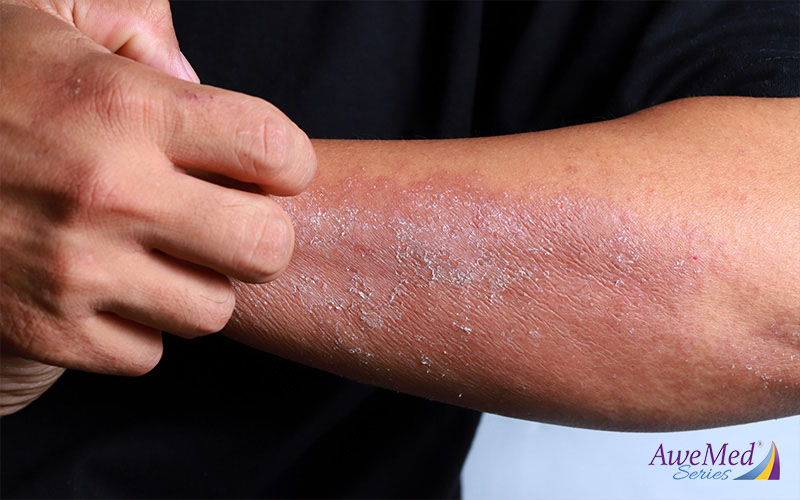
Eczema is an uncomfortable, chronic skin condition causing symptoms, such as persistent itching, that can lower one’s quality of life significantly. A multitude of factors can contribute to eczema flare-ups. We’ll share more about these possible triggers to help you avoid them and minimize discomfort.
1. Risk Factors
While unavoidable, various risk factors can cause an increase in your likelihood of developing eczema, and understanding them is crucial for effective management. Individuals with a family history of eczema are more likely to suffer from it. Those with allergies may also have a higher chance of triggering the condition.
2. Environmental Factors
The world around you can have a huge impact on your skin. From pollutants to weather events, it’s essential that you take extra precautions to protect yourself from external elements to prevent flare-ups.
Extreme weather conditions, both hot and cold, can wreak havoc on eczema-prone skin. Cold, dry air strips the skin of moisture, while hot and humid conditions increase sweating and irritation. These changes disrupt the skin’s barrier function, making it more susceptible to flare-ups.
Substances in the environment, such as pollen, pet dander, dust mites, and other substances can trigger eczema symptoms too. As individuals prone to eczema usually have hypersensitive immune systems, the likelihood of your body reacting severely to allergens and causing inflammation is high.
3. Irritants in Products
From personal care items to household cleaning agents, many products may contain irritants capable of causing uncomfortable and persistent eczema flare-ups. Hair sprays, gels, perfume, cosmetics, detergents, surface cleaners, and many more could comprise a mixture of eczema-triggering chemicals, such as sulfates, formaldehyde, parabens, and fragrances that are particularly irritating to the skin.
4. Food Sensitivities
Certain foods are known to be common triggers of eczema, especially in individuals with food sensitivities. These include dairy products, eggs, nuts, soy, wheat, and fish. Even consuming a small amount of these items may cause flare-ups. When these foods enter your body, your immune system may react to specific proteins and manifest as redness, itching, and inflammation.
5. Fabrics
Some materials, such as polyester and latex, can trigger eczema flare-ups. It’s important to steer clear of clothing or furnishings that incorporate these fabrics as they may trap heat or cause friction against the skin, potentially exacerbating your condition.
Preventing Eczema Triggers
-
Develop a Comprehensive Skincare Routine
Establishing a consistent skincare routine is crucial to preventing eczema. This includes bathing with an eczema body wash made for sensitive skin and moisturizing regularly with an eczema relief moisturizer. For skin care products, always look for organic formulations free of fragrance, parabens, ethanol, and of a low pH level. You may also wish to consult with a dermatologist to develop a regimen suitable for your skin.
Learn More: Soothe the Itch: Experts Share Tips on Managing Eczema With the Right Regimen
-
Adopt a Healthy and Balanced Diet
Nutrition plays a vital role in managing eczema. While it doesn’t directly determine whether you’ll experience flare-ups, it can contribute to healthier skin and protect against severe symptoms. Incorporate omega-3 fatty acids and antioxidant-rich foods, and avoid foods that you could be sensitive to. Remember to hydrate to support healthy bodily functions; water helps to flush out toxins in your body and boost greater skin health, strengthening the skin barrier’s resistance to external elements.
-
Reduce Stress
Stress activates the body’s “fight or flight” response, releasing stress hormones such as cortisol. This can cause inflammation in the body and subsequently, trigger flare-ups. Stress can also compromise the skin barrier function and increase susceptibility to irritation. Consider practicing mindfulness and meditation, engaging in physical activity, and getting ample sleep to promote relaxation and reduce stress levels.
-
Avoid Triggering Environments
Be mindful of your surroundings, and take steps to protect your skin with appropriate clothing or skin care products. Minimize exposure to allergens and pollutants by using air purifiers to keep your living spaces clean, and avoid the use of products that can irritate your skin by choosing eczema-friendly fabrics and materials for your home and belongings.
Understanding the causes and triggers of eczema is a crucial step towards effectively managing this chronic condition. By taking proactive measures to take good care of your skin, you can significantly reduce the frequency and severity of flare-ups.
AweMed Series carries a range of eczema-friendly products, including eczema creams and body washes to help you experience a better quality of life, free from flare-ups. Shop our collection here.
References
Whelan, C. (2023, October 18). How to create an Eczema-Friendly Diet. Healthline. https://www.healthline.com/health/skin-disorders/eczema-diet



